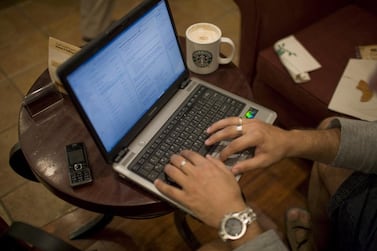We think of the internet as a thriving, democratic network that all of us can connect and contribute to if we wish. But that connection relies on infrastructure that's either put in place by governments or by companies seeking to make a profit, and in unusual circumstances those networks can turn out to be less stable than we imagine.
As widespread demonstrations continue in Hong Kong, protesters who feel unable to trust their usual channels of communication have been turning to apps that bypass the internet altogether, forming so-called "mesh" networks between mobile devices that allow messages to be sent citywide.
One of those apps, Bridgefy, has been downloaded more than 60,000 times in the space of a week, and its rising popularity has alerted people to the issue of how, in our digitally connected society, we might cope if the main communications systems can no longer be trusted.

"The promise of these apps is communication without dependence on any supporting infrastructure," says Paul Gardner-Stephen, senior lecturer at Flinders University in Australia and founder of Serval, a project that actively develops this type of technology. "If the infrastructure can't be used – and that could be because people don't trust it; because of fear of surveillance; because it's being actively denied; or a natural disaster has wiped it out – people need to be able to communicate for society to function effectively."
The Serval Project was inspired by the chaos following the earthquake in Haiti in 2010, where people's inability to contact each other led to their isolation being weaponised, and ultimately the breakdown of social order. But many mesh apps have been developed for more benign circumstances. Bridgefy was intended for use at festivals or sporting events where mobile networks struggle to cope, and the uses for these apps are hugely varied: from the mundane (a camping trip, or to communicate with a friend sat a few rows away on an aeroplane) to the extraordinary (volcanic eruptions or civil unrest).
Part of a wider network
In mesh networks, messages bypass the internet by using protocols that allow devices to talk to each other – for example Bluetooth (used widely in streaming audio) or Apple's AirDrop, a handy way of sending photos or videos directly to a friend who is nearby. An app such as Bridgefy sends messages in much the same way, but every device with it installed becomes a node in a much bigger network. As long as each device is within a short distance of the next (100 metres in the case of Bridgefy), it can quietly participate in the distribution of messages, passing them on to nearby devices until they ultimately reach their destination. It's an ingenious repurposing of technology that was never intended to be used in this way.
The idea of localised, citizen-driven communication that needs no external infrastructure is very appealing to a type of utopian digital thinker. New suites of software could take data out of the hands of the big online companies and, in theory, help to create a parallel network to the internet, a mobile mesh web, which could be fruitfully used by some of the several billion people in the world who might have access to mobile devices but have very little connectivity.
"Society is very dependent on infrastructure," says Gardner-Stephen. "Infrastructure-based communication will always do a better job because of its scale and capacity, and it also has lawful mechanisms for intercepting data that is there for the good of society. But it's important to have some kind of fall-back for when plan A fails and the internet is absent. How do we craft a system that is more resilient to shocks – whatever their cause – and how do we support it in terms of products and a legal framework?"
Awareness of the uses and appeal of mesh technology is growing. This summer, Chinese manufacturer Oppo launched a smartphone that incorporated a "MeshTalk" feature, similar to Bridgefy, but native to the phone, with no app installation needed to make it function. But for mesh networks require ubiquity to achieve their full potential and two problems stand in the way of this: local regulations and a lack of financial incentive for companies to invest in products that bypass middlemen and don't rake in revenue.
"Digital sovereignty lies with the commercial companies, because they're required by law to make the maximum profit that they can," says Gardner-Stephen. "They do that by maintaining maximum control, and I don't begrudge them that, but as a result, the forefront of the decentralisation work is having to be done by open-source initiatives. And funding is scarce because society doesn't recognise how critical it is."
Creating the 'Megaphone'
Five years ago, during protests in Hong Kong, Iran and Iraq, people turned to FireChat, another mesh-based messaging app, to get messages delivered and keep the prying eyes of the state away from them. At the time, there was suspicion that FireChat wasn't as secure a platform as people believed it to be, and Gardner-Stephen agrees that the smartphone, while enabling mesh networks through their sheer ubiquity, is the weak link from a security point of view.
“It’s the complexity of modern devices that causes their insecurity,” he says. “They have billions of transistors and billions of lines of code, and you can’t say that something is secure if it’s more complicated than you can understand. Even if messaging apps are secure, they’re being used on insecure devices over which you have no sovereignty.”
The Serval Project is now working to produce a fully “sovereign” phone, the Megaphone, which is solar powered, based on simple circuitry and able to send data without the internet.
"We're not trying to make a billion-dollar company," says Gardner-Stephen. "But it could effect wider change, which in turn could help to give people back their digital sovereignty." There's a well-known saying that "information wants to be free". Mesh technology may be uniquely poised to fully grant that freedom.






